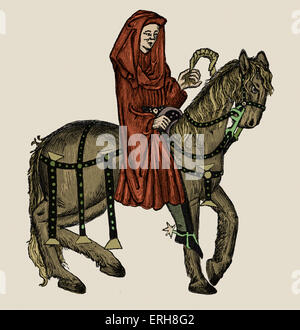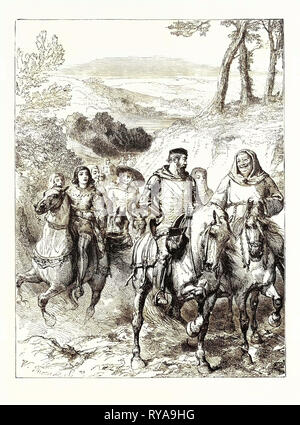

As a comfortable middle class character, the Pardoner seems not to have a care in the world, though he is always on the lookout for opportunities to make a sale. Developed in the late Middle Ages, this literary form was often used in sermons and other didactic literature. Like the Prioress, the Monk is all sorts of things that, as a religious figure, he should probably not be - a hunter, overfed, expensively-dressed in fur and gold. Not only was that, but Odysseus's journey home, another example of the Hero archetype. "The Pardoner's Tale" Archetypal Narrative Elements. allegory illustrating the same message as "the pardoner's tale" or another moral message. In a written response, analyze how grasping the Pardon's point of view requires distinguishing between what is stated and what is not stated but implied throug i. In a sly jab at the Physician, Chaucer tells us that he saves up his gold because "gold in phisik is a cordial" (General Prologue 445). He sings a ballad-"Com hider, love, to me!" (General Prologue, 672)-with the hypocritical Summoner, undermining the already challenged virtue of his profession as one who works for the Church. Learn vocabulary, terms, and more with flashcards, games, and other study tools. Create a Mock Tale - Students will demonstrate their understanding of the Big Idea, irony, theme, tone, and Chaucer's style by writing a mock tale. Hypocrisy in the Pardoner's Prologue and Tale. After the rioters in "The Pardoner's Tale" abandon their search for Death, they murder one another. On a separate sheet of paper, discuss how this message is delivered in the tale. The tasks it takes to be a hero are saving, leading, and conquering. In Geoffrey Chaucer's The Canterbury Tales, 32 characters make the trip to Canterbury. Echoes of the Black Death reverberate throughout the work, most noticeably in the Pardoner's Tale, which allegorizes the plague's contagiousness and lethality, but also through satirical pandemic archetypes including a greedy plague doctor (the Physician), contagious fellow travellers (the Cook and the Summoner), fallen socialites (the. Hardy was a poet as well as a novelist, writing within the Romantic tradition. Reality versus Illusion: Alchemy in The Canterbury Tales. What is ironic about the Pardoner telling a moral tale of greed being the root of all evil? We begin with a literary confession, but unlike "The Wife of Bath's Tale" we do not see any remorse from the pardoner, in fact he boasts of duping people, and does not care whether his pardons actually save them from their sins (Chaucer, 403-406). Pardoner's tale is b lown in on a hot wind of oaths that does not abate until the kiss of. He is shocked at the death of the young Roman girl in the tale, and mourns the fact that her beauty ultimately caused the chain of events that led her father to kill her. We have met gold and treasure before, in Beowulf.Read "The Pardoner's Prologue" and "The Pardoner's Tale," beginning on page 141 of your Purple Book.

What are the several layers of irony in this “masterpiece of irony,” The Pardoner’s Tale?.Has been admitted? Why is the Host so furious? What are the people laughing at when the Knight intervenes? Why do you think the Knight’s intervenes the way he does? How does he expect them to respond? Does he really think he can sell them fake relics after all that What exactly happens? Notice that the Pardoner closes off his account of what he says to the country folk and turns to the pilgrims. This section presents one of the most debated problems of all Chaucer’s work.

Does Chaucer attempt to individualize the revelers? How does the Pardoner distinguish between them? What is poetically just about their deaths?.Are they similar in any way? Many people have taken the old man as symbolic.



 0 kommentar(er)
0 kommentar(er)
